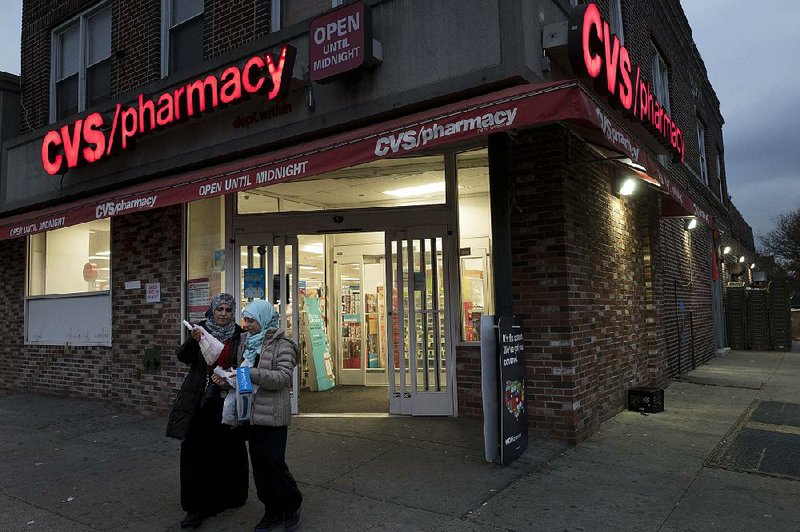Pharmacy giant CVS Health has agreed to buy Aetna in a $69 billion blockbuster acquisition that has the potential to rein in health care costs and transform its 9,700 pharmacy storefronts into community medical hubs for primary care and basic procedures, the companies announced Sunday.
The pharmacy chain agreed to buy Aetna for about $207 per share, broken down into $145 in cash and the rest in stock. The deal is expected to close in the second half of 2018, subject to approval by shareholders and regulators.
If approved, the merger would create a giant consumer health care company with a familiar presence in thousands of communities.
Aetna chief executive Mark Bertolini said in an interview that the merger would create "a new front door for health care in America."
"We want to get closer to the community, because all health care is local," Bertolini said. "What was going to draw people into an Aetna store? Probably not a lot. We looked for the right kind of partnership."
CVS would provide a broad range of health services to Aetna's 22 million medical members at its nationwide network of pharmacies and walk-in clinics, and further decrease the drugstore titan's reliance on the retail sales that have faced increasing competition.
"You can imagine a world where health care is better designed around the people who use it, which is one of the challenges we have today," CVS chief executive Larry Merlo said in an interview. As part of the deal, Bertolini would join the CVS board, and Aetna would be run as a stand-alone business unit.
The deal is likely to set off even more mergers in the health care industry, which has been undergoing consolidation and faces potential new competition from Amazon.
"I think it will create more consolidation among the insurers and retailers, blurring the lines," said Ana Gupte, an analyst at Leerink Partners, who recently pointed to retail giants Walgreens Boots Alliance or Wal-Mart as potential "dark horse acquirers" of the health insurer Humana.
Wall Street analysts have said that the deal could lower health spending -- if, for example, CVS can push customers to use walk-in clinics instead of an emergency room for minor problems. But consumer advocates argue the deal would limit consumer choice and could make it even harder for new companies to enter into a market increasingly dominated by behemoth companies.
Even before the announcement, the familiar drug store chain has been a dominant player in the big business of negotiating drug prices for insurers and employees. The merger would give CVS an even broader role in managing health care.
The combined company could leverage large amounts of data from both Aetna's medical claims and CVS's vast number of touchpoints to consumers, including its 9,700 retail stores and 1,100 MinuteClinics.
CVS plans to turn those locations into a kind of community health hub, where pharmacists and nurses provide follow-up and monitoring to patients recently released from hospital -- and so help avoid re-admission.
The storefronts could also transform preventative care, offering wellness, nutrition and even imaging services -- saving costs by keeping people healthier and providing care in a lower-cost setting than a hospital.
Pharmacists and nurses could help make sure patients with chronic diseases stay on their medications, which would keep those conditions easier to manage than when they get out of control.
"Every health insurance company wants to get closer to the consumer," said Dan Mendelson, president of Avalere Health, a consulting firm. "If a patient is better off by getting a home health visit to have someone go through their medications to take them off 10 and eliminate those medications, I want that to happen -- as opposed to someone just filling prescriptions."
The merger would also better insulate CVS and Aetna against looming competition on two fronts.
The mere possibility that Amazon will soon begin selling drugs has shaken the stocks of companies up and down the drug supply chain, from wholesalers to retail pharmacies. With the move into medical services, CVS could make sure its storefronts offer something beyond aisles stocked with consumer goods that people easily buy elsewhere.
The deal would also protect against competition from health insurers, particularly UnitedHealth Group, that have brought the business of negotiating drugs in-house instead of buying services from a middleman. It will effectively cut out the middleman in negotiating drug prices for health insurers, since CVS is that middleman today, and lock in Aetna's medical members for the pharmacy management side of CVS' business.
A Section on 12/04/2017

